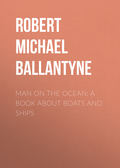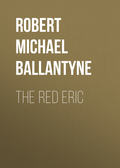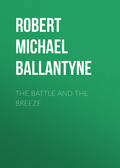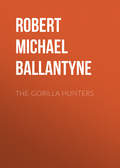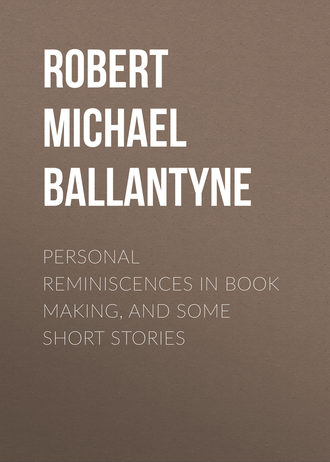
Robert Michael Ballantyne
Personal Reminiscences in Book Making, and Some Short Stories
Chapter Thirteen
A Knotty Question
“Tom Blunt,” said Richard Sharp, “I deny your premises, condemn your reasoning as illogical, and reject your conclusions with scorn!”
The youth who made this remark with very considerable assurance and emphasis was a student. His fellow-student received it with an air of bland good-nature.
“Dick,” said he, “your oratory is rotund, and if it were convincing might be impressive; but it fails to some extent in consequence of a certain smack of self-assertion which is unphilosophical. Suppose, now, that we have this matter out in a calm, dispassionate manner, without ‘tooth,’ or egotism, or prejudice, which tend so powerfully to mar human disputation and render it abortive.”
“With all my heart, Tom,” said the other, drawing close to the fire, placing one foot against the mantelpiece, as being a comfortable, though not elegant posture, resting his elbows on the arms of his chair, and placing his hands in that position—with all the finger tips touching each other—which seems, from the universal practice of civilised society, to assist mental elucidation. “I am quite prepared. Come on!”
“Stay; while my mind is working I like to have my hands employed. I will proceed with my monkey while we talk,” said Blunt, taking up a walking-stick, the head of which he had carved into the semblance of a monkey. “Sweet creature!” he added, kissing the object of his affection, and holding it out at arm’s-length. “Silent companion of my solitary rambles, and patient auditor of my most secret aspirations, you are becoming quite a work of art. A few more touches of the knife, and something like perfection shall have been attained! Look here, Dick, when I turn it towards the light—so—isn’t there a beauty about the contour of that upper lip and nose which—”
“Don’t be a fool, Tom,” interrupted his friend, somewhat impatiently; “you seem to me to be growing more and more imbecile every day. We did not sit down to discuss fine art—”
“True, Richard, true; but there is a power in the consideration of fine art, which, when judiciously interpolated in the affairs of life, tends to soften the asperities, to round away, as it were, the ruggedness of human intercourse, and produce a tranquillity of mind which is eminently conducive to—to—don’t you see?”
“No, I don’t see!”
“Then,” continued Blunt, applying his knife to one of the monkey’s eyes, “there arises the question—how far is this intellectual blindness the result of incapacity of intellectual vision, or of averted gaze, or of the wilful shutting of the intellectual eyelids?”
“Well, well, Tom, let that question alone for the present. Let us come to the point, for I wish to have my mind cleared up on the subject. You hold that gambling is wrong—essentially wrong.”
“I do; but let us not have a misunderstanding at the very beginning,” said Blunt. “By gambling I do not mean the playing of games. That is not gambling. What I understand by gambling is betting on games—or on anything—and the playing of games for the purpose of winning money, or anything that possesses value, great or small. Such gambling I hold to be wrong—essentially, morally, absolutely wrong, without one particle of right or good in it whatever.”
As he spoke Blunt became slightly more earnest in tone, and less devoted to the monkey.
“Well, now, Tom, do you know I don’t see that.”
“If you did see it, my dear fellow,” returned Blunt, resuming his airy tone, “our discussion of the subject would be useless.”
“Well, then, I can’t see it to be wrong. Here are you and I. We want to have a game of billiards. It is uninteresting to play even billiards for nothing; but we each have a little money, and choose to risk a small sum. Our object is not gain, therefore we play for merely sixpenny points. We both agree to risk that sum. If I lose, all right. If you lose, all right. That’s fair, isn’t it?”
“No; it is undoubtedly equal, but not necessarily fair. Fair means ‘free from blemish,’ ‘pure,’ in other words, right. Two thieves may make a perfectly fair division of spoil; but the fairness of the division does not make their conduct fair or right. Neither of them is entitled to divide their gains at all. Their agreeing to do so does not make it fair.”
“Agreed, Tom, as regards thieves; but you and I are not thieves. We propose to act with that which is our own. We mutually agree to run the risk of loss, and to take our chance of gain. We have a right to do as we choose with our own. Is not that fair?”
“You pour out so many fallacies and half truths, Dick, that it is not easy to answer you right off.”
“Morally and politically you are wrong. Politically a man is not entitled to do what he chooses with his own. There are limitations. For instance, a man owns a house. Abstractly, he is entitled to burn it down if he chooses. But if his house abuts upon mine, he may not set it on fire if he chooses, because in so doing he would set fire to my house also, which is very much beyond his right. Then—”
“Oh, man, I understand all that,” said Sharp quickly. “Of course a man may put what he likes in his garden, but with such-like limitations as that he shall not set up a limekiln to choke his neighbours, or a piggery to breed disease; but gambling does nothing like that.”
“Does it not?” exclaimed Blunt. “Does it not ruin hundreds of men, turning them into sots and paupers, whereby the ruined gamblers become unable to pay their fair share of taxation; and, in addition, lay on the shoulders of respectable people the unfair burden of supporting them, and perhaps their families?”
“But what if the gambler has no family?”
“There still remains his ruined self to be maintained.”
“But suppose he is not ruined—that he manages, by gambling, to support himself?”
“In that case he still remains guilty of two mean and contemptible acts. On the one hand he produces nothing whatever to increase the wealth or happiness of the world, and, on the other hand, whatever he gains is a matter of direct loss and sorrow to others without any tangible equivalent. It is not so with the orator or the musician. Though their products are not indeed tangible they are distinctly real and valuable. During the hour of action the orator charms the ear, eye, and intellect. So does the musician. When the hour is past the heart is gladdened by the memory of what has been, and the hopes are aroused in anticipation of what may yet be in the future. As regards the orator, the lessons inculcated may be a lasting gain and pleasure, and source of widespread benefit through life. To a great extent this may also be said of the musician when words are wedded to music. Who has not heard of souls being delivered from spiritual darkness and brought into spiritual light by means of song?—a benefit which will last through eternity as well as time. Even the man of wealth who lives on the interest of his possessions is not necessarily a drone in the human hive. He may, by wise and careful use of his wealth, greatly increase the world’s riches. By the mere management of it he may fill up his days with useful and happy employment, and by devoting it and himself to God he may so influence the world for good that men shall bless him while he lives and mourn him profoundly when he dies. But what fraction of good is done by the gambler in all the wide world?”
“Much the same that is accomplished by the others,” put in Sharp at this point. “The orator gives pleasure to those who are fond of recitation or declamation; the musician pleases those who are fond of sweet sounds, and the gambler gives pleasure to men who are fond of the excitement of play. Besides, by paying his way he gives benefit to all whom he employs. He rents a house, he buys furniture, he eats food, all of which brings profit to house-owners, cabinet-makers, butchers, bakers, etcetera, and is good done to the world by the gambler.”
“Nay, friend Richard, not by the gambler, but by the money which the gambler spends.”
“Isn’t that much the same thing?”
“By no means. The money—or its equivalent—is created by some one else. The gambler merely passes it on. If he had never been born the same money would have been there for some one else to spend. The labour of the gambler has not added one penny to it. He brought nothing into the world, and has added nothing to the world’s pile, though he has managed to consume a good deal of its produce. Is there not something very mean and contemptible in this state of being? On the other hand the orator has spent laborious days and exerted much brain-power before he made himself capable of pleasing and benefiting his fellows. The musician has gone through exhausting drudgery and practice before being fit to thrill or instruct by means of his sweet sounds, and the man of wealth has had to be educated up to the point of using his possessions to profitable account—so that his fields shall grow heavier crops than they did when he began his work; his tenants shall be better housed than they were at first, and shall lead healthier and happier lives to the great moral and material advantage of the community. Nearly all the other members of the hive produce, or help to produce, some sort of equivalent for the money they obtain. Even those who produce what is bad have still something to show for their money, and that something, bad though it be in one form, may be decidedly good in another form, or if put to another use. The gambler alone—except, perhaps, the absolute idler—enjoys the unenviable position of a thorough, out-and-out, unmitigated drone. He does absolutely nothing, except produce unhealthy excitement in himself and his fellows! He has nothing whatever to show for the money he has obtained except ‘risk,’ and that can hardly be styled a commodity.”
“I beg pardon,” interrupted Sharp, “the gambler produces skill; and there can be no doubt that hundreds of men derive as much pleasure from an exhibition of skill with the billiard-cue as others derive from an exhibition of skill with the flute or violin.”
“You forget, Dick, my boy, that skill with the billiard-cue is not gambling. What I condemn as being morally and politically wrong is betting on games and staking anything upon the issue of them. Gamblers are, if I may say so, a set of living pockets which circulate money about amongst themselves, one pocket gaining neither more nor less than what another pocket loses.”
“But you are now talking of professional gamblers, Tom. Of course I don’t defend these. What I do defend is my right to play, now and then, for sixpenny, or say shilling, or even half-crown points, without laying myself open to the charge of having been guilty of what you term a mean, dishonourable, unjust, contemptible act.”
“In other words, you wish to steal now and then without being called a thief! But come, old man, I won’t call you bad names. I know you don’t look at this matter as I do, and therefore I don’t think that you are either mean or contemptible. Nevertheless, we must bear in mind that honourable, upright men may sometimes be reasoned into false beliefs, so that for a time they may fail to see the evil of that which they uphold. I am not infallible. If my reasoning is false, I stand open to correction.”
Laying the monkey down on the table at this point and looking earnestly at his friend, Tom Blunt continued—
“Let me ask a question, Dick. Is it for the sake of getting money that you gamble?”
“Certainly not,” returned his friend, with a slight touch of indignation. “You know that I never play for high stakes, and with penny or sixpenny points you know it is impossible for me either to win or lose any sum that would be worth a moment’s consideration. The game is all that I care for.”
“If so, why do you lose interest in the game when there are no stakes?”
“Oh—well, it’s hard to say; but the value of the stake cannot be that which adds interest, for it is so trifling.”
“I’m not so sure of that, Dick. You have heard gambling talked of as a disease.”
“Yes, but I don’t believe it is.”
“Do you believe that a miser is a morally diseased man?”
“Well, perhaps he is,” returned Sharp; “but a gambler is not necessarily a miser.”
“Yet the two have some symptoms of this moral disease in common. The miser is sometimes rich, nevertheless the covetous spirit is so strong in him that he gloats over a sixpence, has profound interest in gaining it, and mourns over it if lost. You, being well off with a rich and liberal father, yet declare that the interest of a game is much decreased if there are no stakes on it.”
“The cases are not parallel.”
“I did not say they were, but you must admit—indeed you have admitted—that you have one symptom of this disease in common with the miser.”
“What disease?”
“The love of money.”
Richard Sharp burst into a laugh at this, a good-humoured laugh in which there was more of amusement than annoyance.
“Tom, Tom,” he said, “how your notions about gambling seem to blind you to the true character of your friends! Did you ever see me gloating over gold, or hoarding sixpences, or going stealthily in the dead of night to secret places for the purpose of counting over my wealth? Have I not rather, on the contrary, got credit among my friends for being somewhat of a spendthrift? But go on, old fellow, what more have you to say against gambling—for you have not yet convinced me?”
“Hold on a bit. Let me pare off just a morsel of my monkey’s nose—there, that’s about as near perfection as is possible in a monkey. What a pity that he has not life enough to see his beautiful face in a glass! But perhaps it’s as well, for he would never see himself as others see him. Men never do. No doubt monkeys are the same. Well now,” continued Blunt, again laying down the stick, and becoming serious, “try if you can see the matter in this light. Two gamblers meet. Not blacklegs, observe, but respectable men, who nevertheless bet much, and play high, and keep ‘books,’ etcetera. One is rich, the other poor. Each wishes ardently to gain money from his friend. This is a somewhat low, unmanly wish, to begin with; but let it pass. The poor one has a wife and family to keep, and debts to pay. Many thousands of men, ay, and women, are in the same condition, and work hard to pay their debts. Our poor gambler, however, does not like work. He prefers to take his chance at gambling; it is easier, he thinks, and it is certainly, in a way, more exciting than work. Our rich gambler has no need to work, but he also likes excitement, and he loves money. Neither of these men would condescend for one moment to ask a gift of money from the other, yet each is so keen to obtain his friend’s money that they agree to stake it on a chance, or on the issue of a contest. For one to take the money from the other, who does not wish to part with it, would be unfair and wrong, of course; but their agreement gets rid of the difficulty. It has not altered the conditions, observe. Neither of them wishes to give up his money, but an arrangement has been come to, in virtue of which one consents to be a defrauder, and the other to be defrauded. Does the agreement make wrong right?”
“I think it does, because the gamblers have a right to make what agreement they please, as it is between themselves.”
“Hold there, Dick. Suppose that the poor man loses. Is it then between themselves? Does not the rich gambler walk away with the money that was due to the poor one’s butcher, baker, brewer, etcetera?”
“But the rich one did not know that. It is not his fault.”
“That does not free the poor gambler from the dishonourable act of risking money which was not his own; and do you really think that if the rich one did know it he would return the money? I think not. The history of gambling does not point to many, if any, such cases of self-sacrifice. The truth is that selfishness in its meanest form is at the bottom of all gambling, though many gamblers may not quite see the fact. I want your money. I am too proud to ask it. I dare not demand it. I cannot cajole you out of it. I will not rob you. You are precisely in the same mind that I am. Come, let us resort to a trick, let us make an arrangement whereby one of us at least shall gain his sneaking, nefarious, unjust end, and we will, anyhow, have the excitement of leaving to chance which of us is to be the lucky man. Chance and luck! Dick Sharp, there is no such condition as chance or luck. It is as surely fixed in the mind of God which gambler is to gain and which to lose as it is that the morrow shall follow to-day.”
“My dear Blunt, I had no idea you were such a fatalist,” said Sharp in surprise.
“I am not a fatalist in the sense you mean,” returned his friend. “Everything has been fixed from the beginning.”
“Is not that fatalism of the most pronounced nature, Tom?”
“You don’t seem to see that, among other fixtures, it was fixed that free-will should be given to man, and with it the right as well as the power to fix many things for himself, also the responsibility. Without free-will we could have had no responsibility. The mere fact that God of course knew what each man would will, did not alter the fixed arrangement that man has been left perfectly free to will as he pleases. I do not say that man is free to do as he pleases. Sometimes the doing is permitted; sometimes it is interfered with—never the willing. That is always and for ever free. Gamblers use their free-wills, often to their own great damage and ruin; just as good men use their free-wills to their great advantage and happiness. In both cases they make free use of the free-wills that have been bestowed on them.”
“Then I suppose that you consider gambling, even to the smallest extent, to be sin?”
“I do.”
“Under which of the ten commandments does it fall?”
“‘Thou shalt not covet.’”
Chapter Fourteen
Two Remarkable Dreams
Some natures are better than others. There can be no question about that. Some dispositions are born moderately sweet, others are born slightly sour. If you doubt the fact, reader, go study Nature, or get you to an argumentative friend and dispute the point. We refuse flatly to enter into a discussion of the subject.
Look at that little boy sleeping there under the railway arch in the East End of London—not the boy with the black hair and the hook nose and the square under-jaw, but the one with the curly head, the extremely dirty face, and the dimpled chin, on the tip of whose snub nose the rising sun shines with a power that causes it to resemble a glowing carbuncle on a visage still lying in shadow.
That little boy’s disposition is sweet. You can see it in every line, in every curve, in every dimple of his dirty little face. He has not been sweetened by training, he has had no training—at least none from man or woman with a view to his good. He has no settled principles of any kind, good or bad. All his actions are the result of impulse based on mere animal propensity, but, like every other human being, he has a conscience. At the time of his introduction to the reader his conscience is, like himself, asleep, and it has not as yet been much enlightened. His name is Stumpy, but he was never christened.
Critical minds will object here that a boy would not be permitted to sleep under a railway arch, and that London houses would effectually prevent the rising sun from entering such a place. To which we reply that the arch in question was a semi-suburban arch; that it was the last, (or the first), of a series of arches, an insignificant arch under which nothing ever ran except stray cats and rats, and that it spanned a morsel of waste ground which gave upon a shabby street running due east, up which, every fine morning, the rising sun gushed in a flood of glory.
Each fleeting moment increased the light on Stumpy’s upturned nose, until it tipped the dimpled chin and cheeks and at last kissed his eyelids. This appeared to suggest pleasant dreams, for the boy smiled like a dirty-faced angel. He even gave vent to an imbecile laugh, and then awoke.
Stumpy’s eyes were huge and blue. The opening of them was like the revealing of unfathomable sky through clouds of roseate hue! They sparkled with a light all their own in addition to that of the sun, for there was in them a gleam of mischief as their owner poked his companion in the ribs and then tugged his hair.
“I say, you let me alone!” growled the companion, turning uneasily on his hard couch.
“I say, you get up,” answered Stumpy, giving the companion a pinch on the tender part of his arm. “Come, look alive, Howlet. I sees a railway porter and a bobby.”
Owlet, whose nose had suggested his name, had been regardless of the poke, the tug, and the pinch, but was alive to the hint. He at once came to the sitting posture on hearing the dreaded name of “bobby,” and rubbed his eyes. On seeing that there was neither policeman nor guard near, he uttered an uncomplimentary remark and was about to lie down again, but was arrested by the animated expression of his comrade’s face and the heaving of his shoulders.
“Why, what ever is the matter with you?” he demanded. “Are you goin’ to bust yourself wi’ larfin’, by way of gettin’ a happetite for the breakfast that you hain’t no prospect of?”
To this Stumpy replied by pulling from his trousers pocket four shining pennies, which he held out with an air of triumph.
“Oh!” exclaimed Owlet; and then being unable to find words sufficiently expressive, he rubbed the place where the front of his waistcoat would have been if he had possessed one.
“Yes,” said Stumpy, regarding the coppers with a pensive air, “I’ve slep’ with you all night in my ’and, an’ my ’and in my pocket, an’ my knees doubled up to my chin to make all snug, an’ now I’m going to have a tuck in—a blow out—a buster—a—”
He paused abruptly, and looking with a gleeful air at his companion, said—
“But that wasn’t what I was laughin’ at.”
“Well, I suppose it warn’t. What was it, then?”
The boy’s eyes sparkled again, and for some moments a half-suppressed chuckling prevented speech.
“It was a dream,” he said at last.
“A dream!” exclaimed Owlet contemptuously.
“I hate dreams. When I dreams ’em they’re always about bobbies and maginstrates, an’ wittles, an’ when other fellows tells about ’em they’re so long-winded an’ prosy. But I had a dream too. What was yours?”
“My dream was about a bobby,” returned his friend. “See, here it is, an’ I won’t be long-winded or prosy, Howlet, so don’t growl and spoil your happetite for that ’ere breakfast that’s a-comin’. I dreamed—let me see, was it in Piccadilly—no, it was Oxford Street, close by Regent Street, where all the swells go to promynade, you know. Well, I sees a bobby—of course I never can go the length my little toe without seein’ a bobby! but this bobby was a stunner. You never see’d sitch a feller. Not that he was big, or fierce, but he had a nose just two-foot-six long. I know for certain, for I’m a good judge o’ size, besides, I went straight up to him, as bold as brass, and axed him how long it was, an’ he told me without winkin’. The strange thing about it is that I wasn’t a bit surprised at his nose. Wery odd, ain’t it, eh, Howlet, that people never is surprised at anything they sees in dreams? I do b’lieve, now, if I was to see a man takin’ a walk of a’ arternoon with his head in his coat-tail pocket I’d take it quite as a matter of course.
“Well, w’en that bobby had told me his nose was two-foot-six inches long I feels a most unaccountable and astonishin’ gush of indignation come over me. What it was at I don’t know no more nor the man in the moon. P’r’aps it was the sudden thought of all the troubles that bobbies has brought on me from the day I was born till now. Anyhow, I was took awful bad. My buzzum felt fit to bust. I knowed that I must do somethin’ to him or die; so I seized that bobby by the nose, and hauled him flat down on his breast. He was so took with surprise that he never made any struggle, but gived vent to a most awful howl. My joy at havin’ so easily floored my natural enemy was such that I replied with a Cherokee yell. Then I gave his nose a pull up so strong that it well-nigh broke his neck an’ set him straight on his pins again! Oh! Howlet, you can’t think what a jolly dream it was. To do it all so easy, too!”
“Well, what happened arter that?” asked Owlet.
“Nothin’ happened after that,” returned Stumpy, with a somewhat sad expression on his usually gleeful visage. “It’s a wery strange thing, Howlet, that dreams inwariably wanishes away just at the most interestin’ p’int. Did you ever notice that?”
“Notice it! I should think I did. Why the dream that I had w’en I was layin’ alongside o’ you was o’ that sort exactly. It was all about wittles, too, an’ it’s made me that ’ungry I feels like a ravagin’ wolf.”
“Come along, then, Howlet, an’ you an’ me will ravage somethin’ wi’ them browns o’ mine. We’ll ’ave a good breakfast, though it should be our last, an’ I’ll stand treat.”
“You’re a trump, Stumpy; an’ I’ll tell you my dream as we goes along.”
“Hall right—but mind you don’t come prosy over me. I can’t stand it no more nor yourself.”
“You mind Dick Wilkin, don’t you?”
“What—the young man from the country as I’ve see’d standin’ at the dock gates day after day for weeks without getting took on?”
“That’s him,” continued Owlet, with a nod, as he shoved his hand into his trousers pockets. “He brought a wife and five kids from the country with him—thinkin’ to better hisself in London. Ha! a sweet little town for a cove as is ’ard up to better hisself in—ho yes, certingly!” remarked the precocious boy in a tone of profound sarcasm.
“Well,” he continued, “Dick Wilkin came to better hisself an’ he set about it by rentin’ a single room in Cherubs Court—a fine saloobrious spot, as you know, not far from the Tower. He ’ad a few bobs when he came, and bought a few sticks o’ furniture, but I don’t need for to tell you, Stumpy, that the most o’ that soon went up the spout, and the Wilkins was redooced to beggary—waried off an’ on with an odd job at the docks. It was when they first comed to town that I was down wi’ that fever, or ’flenzy, or somethink o’ that sort. The streets bein’ my usual ’abitation, I ’ad no place in partikler to go to, an’ by good luck, when I gave in, I lay down at the Wilkins’ door. O! but I was bad—that bad that it seemed as if I should be cleared out o’ my mortal carcase entirely—”
“Mulligrumps?” inquired his sympathetic friend.
“No, no. Nothin’ o’ that sort, but a kind of hot all-overishness, wi’ pains that—but you can’t understand it, Stumpy, if you’ve never ’ad it.”
“Then I don’t want to understand it. But what has all this to do wi’ your dream?”
“Everythink to do with it, ’cause it was about them I was dreamin’. As I was sayin’, I fell down at their door, an’ they took me in, and Mrs Wilkin nussed me for weeks till I got better. Oh, she’s a rare nuss is Mrs Wilkin. An’ when I began to get better the kids all took to me. I don’t know when I would have left them, but when times became bad, an’ Dick couldn’t git work, and Mrs Wilkin and the kids began to grow thin, I thought it was time for me to look out for myself, an’ not remain a burden on ’em no longer. I know’d they wouldn’t let me away without a rumpus, so I just gave ’em the slip, and that’s ’ow I came to be on the streets again, an’ fell in wi’ you, Stumpy.”
“’Ave you never seen ’em since?”
“Never.”
“You ungrateful wagibone!”
“What was the use o’ my goin’ to see ’em w’en I ’ad nothin’ to give ’em?” returned Owlet in an apologetic tone.
“You might ’ave given ’em the benefit of your adwice if you ’ad nothin’ else. But what did you dream about ’em?”
“I dreamt that they was all starvin’—which ain’t unlikely to be true—an’ I was so cut up about it, that I went straight off to a butcher’s shop and stole a lot o’ sasengers; then to a baker’s and stole a loaf the size of a wheel-barrer; then to a grocer’s and stole tea an’ sugar; an’ the strange thing was that neither the people o’ the shops nor the bobbies seemed to think I was stealin’! Another coorious thing was that I carried all the things in my pockets—stuffed ’em in quite easy, though there was ’arf a sack o’ coals among ’em!”
“Always the way in dreams,” remarked his friend philosophically.
“Yes—ain’t it jolly convenient?” continued the other. “Well, w’en I got to the ’ouse I set to work, made a rousin’ fire, put on the kettle, cooked the wittles as if I’d bin born and bred in a ’otel, and in less than five minutes ’ad a smokin’ dinner on the table, that would ’ave busted an alderman. In course the Wilkins axed no questions. Father, mother, five kids, and self all drew in our chairs, and sot down—”
“What fun!” exclaimed Stumpy.
“Ay, but you spoilt the fun, for it was just at that time you shoved your fist into my ribs, and woke me before one of us could get a bite o’ that grub into our mouths. If we’d even ’ad time to smell it, that would ’ave bin somethink to remember.”
“Howlet,” said the other impressively, “d’ye think the Wilkins is livin’ in the same place still?”
“As like as not.”
“Could you find it again?”
“Could I find Saint Paul’s, or the Moniment? I should think so!”
“Come along, then, and let’s pay ’em a wisit.”
They were not long in finding the place—a dirty court at the farther end of a dark passage.
Owlet led the way to the top of a rickety stair, and knocked at one of the doors which opened on the landing. No answer was returned, but after a second application of the knuckles, accompanied by a touch of the toe, a growling voice was heard, then a sound of some one getting violently out of bed, a heavy tread on the floor, and the door was flung open.
“What d’ee want?” demanded a fierce, half-drunken man.
“Please, sir, does the Wilkins stop here?”
“No, they don’t,” and the door was shut with a bang.
“Sweet creature!” observed Stumpy as they turned disappointed away.
“Wonder if his mother ’as any more like ’im?” said Owlet.
“They’ve ’ad to change to the cellar,” said a famished-looking woman, putting her head out of a door on the same landing. “D’ye want ’em?”



